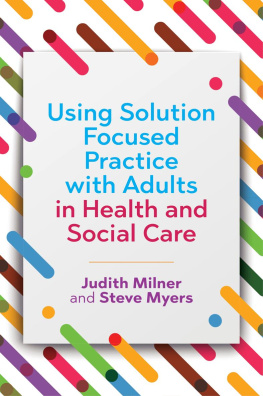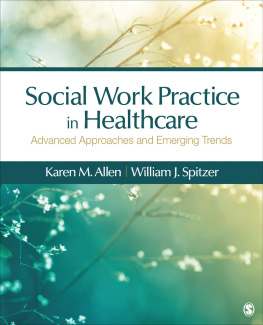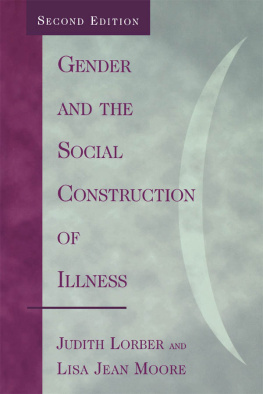Chapter One
Useful Conversations
Positive Approaches to Working with Adults
In writing this book, we have endeavoured to highlight how solution focused practice can be useful to a broad range of practitioners working with adults whether in health and social care, with older age and end of life care, with physical or intellectual disability and mental ill-health. These can be nurses, health visitors, occupational therapists, physiotherapists, social carers, social workers, housing support workers and counsellors in residential or community-based settings. We aim to offer a unifying theoretical underpinning which outlines the basic philosophy of the approach and what it looks like in reality.
The techniques described in this book are compatible with the professional requirements of all those professions listed above, and they can be used to help promote the Well-being principle of the Care Act 2014 (in England) in the areas of: personal dignity; physical and mental health and emotional well-being; protection from abuse and neglect; control by the individual over their day-to-day life; domestic, family and personal; suitability of living accommodation; participation in work, education, training or recreation; social and economic well-being and the individuals contribution to society.
They also help to meet the principle outlined in the Social Services and Well-being (Wales) Act 2014, which specifies that People have control over what support they need, making decisions about their care and support as an equal partner (p.3) even where a person appears to be very muddled in their thinking, as the following example shows.
CASE EXAMPLE
Mrs Brown was perhaps a little too decisive about giving up her own home for residential care. When seen at her bedside in hospital, where she had been admitted after a fall, she had difficulty remembering where she lived, where she was currently and who had been to see her. For example, when Judith asked if she could sit on her bed while they talked, she was unsure whose bed it was. Although some of her memories were dim, the gaps did not divide easily into long- or short-term ones and it was possible that her confusion was exacerbated by a long period of self-neglect when she had refused help, and perhaps some underlying sadness as she made several comments about having lived long enough.
The different components of her confusion included forgetfulness, muddle, sadness and, possibly, weariness resulting from a prehospital period of struggle and difficulty with everyday living. Solution focused questions were asked to get a feel of how this seemingly confused elderly person saw herself and whether her perception matched the presentation of herself to both ward and multi-disciplinary team members.
After several conversations with Mrs Brown in hospital, it emerged that she wanted a residential placement where she would not have to worry about cooking and managing money. What continued to be important to her was the type and location of the residential home, which she hoped would be lively, with friendly residents, and near enough to her old home so that she could resume social activities at her church as soon as her mobility improved and her pain eased. Pain, she said, caused her to worry more and this had probably prevented her from maintaining her links with the community in which she had lived most of her life and which centred on her local church.
A visit was arranged so that Mrs Brown could spend some time in a home selected as most meeting her hopes. She became much more animated and less muddled as she left hospital and recognised familiar surroundings; even her mobility improved and it was easier to get her out of the wheelchair at the home than it had been to get her into it in hospital.
The visit proved tiring for Mrs Brown, who greeted Judith on arrival to collect her with a heartfelt, Oh, I am glad youve come. I know you, dont I? I dont know where I am. She was much more muddled on the return journey, which took her past her old home; she thought someone else was living there, she had forgotten which of her first two names her husband called her by, and she was unsure why she was going back to hospital although she was keen to get to bed.
Talking with her the next day when she was rested, she gave a coherent account of chatting with some women she didnt know about having their hair done and, at first, she seemed to be talking about old memories. She then said, I dont think I know them But if they can have their hair done, it must be a nice place. Ill be all right there. I cant remember their names But they were friendly. When well enough, she was admitted to the home and settled in easily; she remained muddled about many things but had her hair permed immediately and was clearly enjoying the company of the other residents.
While specific training requirements in different sectors will inevitably differ, one unifying theme running through all sectors is the importance of hearing the voice of the person. Traditionally, our knowledge of people and accepted ways of working with them has been influenced by psychiatric and psychological knowledge. This is extremely useful, but it is fundamentally problem-based, with people categorised so that they can be more easily understood and treated by expert professionals.
It can be argued that categorisation is helpful; for example, an adult diagnosed with attention deficit hyperactivity disorder (ADHD) will then receive the medical intervention (medication, therapy) that is considered required, and the diagnosis provides an understanding of why they are behaving in a particular way. An alternative argument, however, is that this diagnosis then places the problem within the person, which can lead to the person becoming pathologised: labels help us recognise patterns of behaviour but should not be mistaken for people doing that behaviour (Winbolt 2011, p.72).
Furthermore, categorisation can define and conclude what intervention is best for the individual without considering their own unique ideas and strengths with regards to what would work best for them in the future:
we noticed that social workers, parents and partners of people with autism are often concerned that people with autism may be socially isolated because they appear to have few friends. If, however, somebody with autism feels perfectly happy with just one close friend and a few contacts on social media, who are we to judge that this cannot be sufficient for a good and meaningful life? (Mattelin and Volckaert 2017, p.14)
Speech and language therapist, Kidge Burns similarly comments that recovery from incapacitating illness is more likely to be the development of a desired lifestyle rather than simply symptom removal (2016, p.20), whilst psychiatrist Alasdair Macdonald (2011) noted that while many people want to alleviate distressing symptoms of severe mental illness, others prefer to work on life skills, or how to effect an early discharge form hospital.
PRACTICE ACTIVITY
Ahktar was diagnosed as being on the Autistic Spectrum at secondary school and was allocated a support worker to assist him in coping with the other students boisterous behaviour.
What are the benefits for Ahktar of his diagnosis?
What are the possible negative impacts for Ahktar of his diagnosis?
How can you make best use of the benefits of the labels given to the people with whom you work?
How can you use these benefits whilst avoiding any negative impacts?











